Aqa biology stuvia 2024 - Study guides, Class notes & Summaries
Looking for the best study guides, study notes and summaries about Aqa biology stuvia 2024? On this page you'll find 18 study documents about Aqa biology stuvia 2024.
All 18 results
Sort by
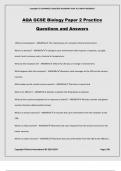
-
AQA GCSE Biology Paper 2 Practice Questions and Answers
- Exam (elaborations) • 40 pages • 2024
-
- $13.49
- + learn more
AQA GCSE Biology Paper 2 Practice Questions and Answers What is homeostasis? - ANSWER-The maintenance of a constant internal environment. What is a stimulus? - ANSWER-A change in your environment than requires a response. e.g Light, sound, touch, pressure, pain, chemical or temperature. What do the receptors do? - ANSWER-Detect the stimulus or change in environment. What happens after the receptors? - ANSWER-Receptors send messages to the CNS via the sensory neurone. What makes up the ce...
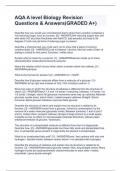
-
AQA A level Biology Revision Questions & Answers(GRADED A+)
- Exam (elaborations) • 53 pages • 2024
- Available in package deal
-
- $13.99
- + learn more
Describe how you would use a biochemical test to show that a solution contained a non-reducing sugar, such as sucrose. [3] - ANSWER,first reducing sugars test; boil with dilute HCl acid then Neutralise with NaHCǑ, add benedict and heat to 95 degrees C brick red ppt forms if reducing sugar is present Describe a chemical test you could carry out to show that a piece of coconut contains lipids. [3] - ANSWER(Crush in) ethanol / alcohol; Add (to) water (Order of adding is critical for this point)...
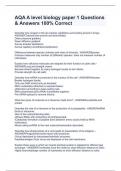
-
AQA A level biology paper 1 Questions & Answers 100% Correct
- Exam (elaborations) • 23 pages • 2024
- Available in package deal
-
- $12.99
- + learn more
Describe how oxygen in the air reaches capillaries surrounding alveoli in lungs - ANSWERTrachea and bronchi and bronchioles; Down pressure gradient; Down diffusion gradient; Across alveolar epithelium; Across capillary endothelium/epithelium; Difference between species richness and index of diversity - ANSWERSpecies richness measures only number of (different) species / does not measure number of individuals; Explain how cellulose molecules are adapted for their function in plant cells...
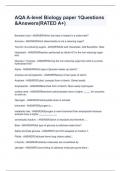
-
AQA A-level Biology paper 1Questions &Answers(RATED A+)
- Exam (elaborations) • 14 pages • 2024
- Available in package deal
-
- $13.09
- + learn more
Benedict's test - ANSWERWhich food test is heated in a water bath? Sucrose - ANSWERWhich disaccharide is not a reducing sugar? Test for non-reducing sugars - ANSWERAdd acid. Neutralise. Add Benedicts. Heat. Hydrolysis - ANSWERReaction performed by dilute HCl in the non reducing sugar test. Glucose + fructose - ANSWERDuring the non-reducing sugar test what is sucrose hydrolysed into? Alpha - ANSWERWhich type of glucose makes up starch? amylose and amylopectin - ANSWERNames of t...
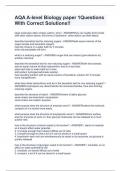
-
AQA A-level Biology paper 1Questions With Correct Solutions!!
- Exam (elaborations) • 14 pages • 2024
- Available in package deal
-
- $12.99
- + learn more
large molecules often contain carbon. why? - ANSWERthey can readily form bonds with other carbon atoms. this forms a 'backbone'. other atoms can then attach. describe benedicts test for reducing sugars - ANSWERadd equal volumes of the sugar sample and benedicts reagent. heat the mixture in a water bath for 5 minutes. brick red precipitate will form. what is a reducing sugar? - ANSWERa sugar that can reduce (give electrons to) another chemical. describe the benedicts test for non red...
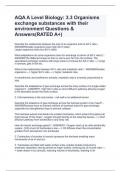
-
AQA A Level Biology: 3.3 Organisms exchange substances with their environment Questions & Answers(RATED A+)
- Exam (elaborations) • 15 pages • 2024
- Available in package deal
-
- $12.99
- + learn more
Describe the relationship between the size of an organism and its SA:V ratio - ANSWERSmaller organisms have high SA:V ratios Larger organisms have low SA:V ratios What adaptations do some organisms have for exchange (in terms of SA:V ratio)? - ANSWERThe flattened shape so that no cell is ever far from the surface. The specialised exchange surfaces with large areas to increase the SA:V ratio ---> lungs in animals, gills in fish etc. What is the relationship between SA:V ratio and metabo...
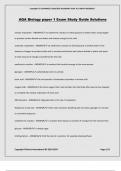
-
AQA Biology paper 1 Exam Study Guide Solutions
- Exam (elaborations) • 12 pages • 2024
-
- $12.49
- + learn more
AQA Biology paper 1 Exam Study Guide Solutions aerobic respiration - ANSWER-an exothermic reaction in which glucose is broken down using oxygen to produce carbon dioxide and water and release energy for the cells anaerobic respiration - ANSWER-an exothermic reaction in which glucose is broken down in the absence of oxygen to produce lactic acid in animals and ethanol and carbon dioxide in plants and yeast. A small amount of energy is transferred for the cells exothermic reaction - ANSWER-a...
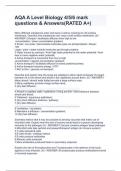
-
AQA A Level Biology 4/5/6 mark questions & Answers(RATED A+)
- Exam (elaborations) • 13 pages • 2024
- Available in package deal
-
- $12.99
- + learn more
Many different substances enter and leave a cell by crossing its cell surface membrane. Describe how substances can cross a cell surface membrane. (5) - ANSWER1 (Simple / facilitated) diffusion from high to low concentration / down concentration gradient; 2 Small / non-polar / lipid-soluble molecules pass via phospholipids / bilayer; OR Large / polar / water-soluble molecules go through proteins; 3 Water moves by osmosis / from high water potential to low water potential / from less to mo...
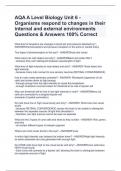
-
AQA A Level Biology Unit 6 - Organisms respond to changes in their internal and external environments Questions & Answers 100% Correct
- Exam (elaborations) • 14 pages • 2024
- Available in package deal
-
- $12.99
- + learn more
What kind of receptors are changes in blood pH and pressure detected by? - ANSWERchemoreceptors and pressure receptors in the aorta or carotid artery Two types of photoreceptors in the eye? - ANSWERrods and cones What colour do rods detect and why? - ANSWERBlack and white ONLY - because they can't distinguish between wavelengths of light What kind of light intensity do rods detect and why? - ANSWER- Rods detect low light intensity - because many rods connect to one sensory neurone (R...
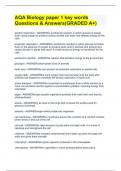
-
AQA Biology paper 1 key words Questions & Answers(GRADED A+)
- Exam (elaborations) • 7 pages • 2024
- Available in package deal
-
- $11.99
- + learn more
aerobic respiration - ANSWERan exothermic reaction in which glucose is broken down using oxygen to produce carbon dioxide and water and release energy for the cells anaerobic respiration - ANSWERan exothermic reaction in which glucose is broken down in the absence of oxygen to produce lactic acid in animals and ethanol and carbon dioxide in plants and yeast. A small amount of energy is transferred for the cells exothermic reaction - ANSWERa reaction that transfers energy to the environment...

How did he do that? By selling his study resources on Stuvia. Try it yourself! Discover all about earning on Stuvia


